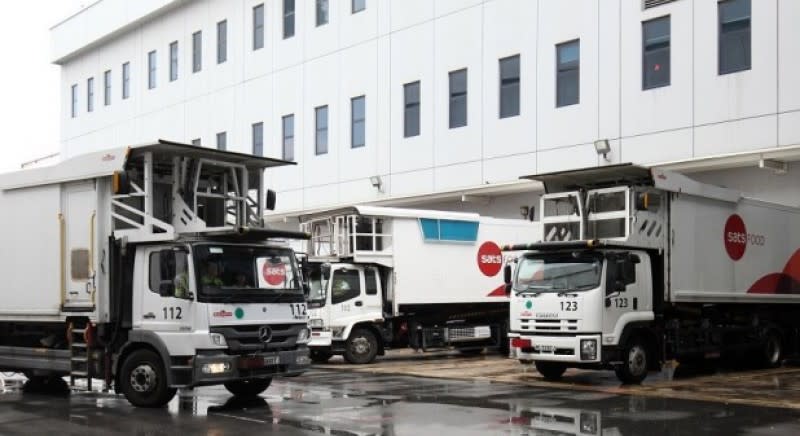UOB Kay Hian upgrades SATS to 'buy' after sharp drop in share price

Since SATS’ first trading halt on Sept 21, its share price has declined 33% from $4.06 to $2.72, its closing price as at Oct 18.
UOB Kay Hian analyst Roy Chen has upgraded SATS to “buy” from “hold” previously after the airline ground handler and food catering services provider saw a sharp drop in its share price after announcing that it has proposed to acquire Worldwide Flight Services (WFS).
Chen’s report dated Oct 19 comes after an investor meeting with SATS during UOB Kay Hian’s Asian Gem Conference on Oct 18. The meeting was attended by 19 institutional investors. At the meeting, SATS’s management shared more insights and answered more questions on the WFS deal.
On Sept 28, SATS announced its plans to acquire WFS, which is the world’s largest air cargo handling firm, for EUR1.19 billion ($1.64 billion) in cash.
Since SATS’ first trading halt on Sept 21 related to the WFS deal, SATS’ share price has declined 33% from $4.06 before the trading halt to $2.72, which is the company’s closing price on Oct 18, notes Chen.
“This is likely due to the market’s unfavourable view towards the deal and the weak sentiment towards the equity raising plan,” he says. “During this period, $1.5 billion worth of SATS’ market cap has been evaporated; this is equivalent to about 45% of WFS’ acquisition enterprise value of $3.1 billion”.
On the back of the sharp drop in its share price, SATS’s risk-reward profile is now more attractive in the analysts’ view, with the current share price suiting investors with a long-term horizon, Chen adds.
“Assuming SATS’ existing business is still worth the value as it was and attributing all market cap drop to the deal of WFS, the market is now effectively valuing WFS at an enterprise value of $1.6 billion (being transaction enterprise value of $3.1 billion less SATS’ market cap drop of $1.5 billion),” Chen writes.
“This means, if one buys SATS at the current price, he is effectively paying only 4.9x ebitda (based on WFS’s 12- month ebitda ended March) for the WFS deal, instead of the original transaction EV/ebitda multiple of 9.7x,” he adds. “The effective 4.9x EV/ebitda looks attractive, considering that this is pre synergy and WFS is the top global air cargo handler.”
Furthermore, the implied valuation of 4.9x EV/ebitda is cheap, compared to the previous transactions made by SATS’s peers. The historical peer transaction range usually came at a range of 10.1x-10.7x.
A lower target price
Despite the upgrade, Chen has lowered his target price estimate to $3.08 from $3.82 previously. The new target price is based on a sum-of-the-parts (SOTP) valuation, which factors in “very conservative” valuation metrics for WFS.
“To derive the fair valuation for SATS, we first get the standalone valuation for SATS’ existing businesses by discounted cash flow or DCF (8.0% weighted average cost of capital or WACC) and then add the valuation impact of the WFS deal, which in turn is determined by our conservative valuation for WFS (based on 7x ebitda, very conservatively pegging to the fire sale valuation multiple of Swissport) less the WFS acquisition cost (based on 9.7x ebitda),” Chen explains.
“We prefer to be conservative in the valuation of WFS, due to the higher risk-free rates today (compared with when SATS negotiated the deal valuation), weakening global air cargo outlook in the near term (as highlighted by a few leading air cargo operators including FedEx and DHL), and the lack of financial details of WFS,” he says. “We will review our valuation for SATS pending more clarity on the WFS deal.”
In his report, Chen has kept his earnings estimates unchanged as he has yet to incorporate WFS’s financials into his projections for SATS.
However, at this point, the analyst sees no strong near-term catalyst for the latter.
“The uncertainties related to the WFS deal may remain an overhang on share price in the near term,” Chen writes, adding that SATS’s investors may need to adopt a medium-to-long term view.
In his opinion, medium-term catalysts could include SATS successfully integrating WFS and delivering its forecasted synergies. An improving global air cargo outlook would also help boost the airline ground handler and food catering services provider’s share price, he adds.
As at 1.50pm, shares in SATS are trading 3 cents lower or 1.10% down at $2.69.
See Also:
Click here to stay updated with the Latest Business & Investment News in Singapore
Analysts remain 'overweight' on tech manufacturers despite negative outlook in near-term
Citi Research downgrades MINT to 'neutral' with lowered TP of $2.22
CGS-CIMB slashes AEM's TP by over 40% on fears of order deferments
Get in-depth insights from our expert contributors, and dive into financial and economic trends

 Yahoo Finance
Yahoo Finance 